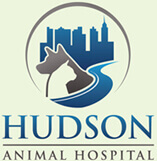Learn How to Prevent Heatstroke in Your Pet
We may think of heatstroke as a problem only for people, but heatstroke can be extremely dangerous for your pet as well. Heatstroke is a danger that every pet owner needs to be aware of during these hot summer months, for it can be easily prevented by paying attention to the weather and planning properly.
Heatstroke occurs when your pet’s body temperature gets too high and your pet cannot effectively cool itself down quickly enough. Heatstroke can occur rapidly, and because your pet can’t tell you when symptoms begin, you must plan ahead to make sure your dog or cat does not suffer from this miserable and potentially deadly condition.
Temperatures often soar here in the Upper West Side during the summertime, so here are some tips from the staff at Hudson Animal Hospital to help keep your feline and canine companions safe and comfortable this summer:
1) Remember that humidity can make it feel hotter than it is. The high humidity of New York summers can make a hot day feel even hotter for your pet. And animals do not have the luxury of wearing shorts or tank tops! Keep an eye on the humidity as well as the temperature during the summer months.
2) Do not ever leave your pet in a parked car unattended. The temperature inside a closed car can very quickly reach a deadly level. Plan ahead: leave your pet at home or take your pet inside with you. Don’t risk harm to your beloved pet by leaving it in a hot car.
3) On very hot and humid days, limit outside activities. Plan exercise for days when it is cooler or schedule it for very early in the morning before it gets too hot. Always offer plenty of water before and after any outdoor activities.
4) Provide shady spots outside. If you are spending the day mostly outside, make sure there is plenty of shade your pet can enjoy on sweltering days. Again, also provide a steady supply of water; pets will likely drink more than usual on hot days, so be sure to check water bowls often.
5) Learn the danger signs. Signs of heatstroke can include high body temperature, panting that is more than usual, dry mouth, color alteration of gums and tongue, unusual behavior, and diarrhea or vomiting. In short, if your pet is behaving abnormally after being outside on a hot day, you should try to cool your pet down and then contact your vet immediately to get help.
6) Bring your pet inside. There may be some days this summer when pets need to be brought inside where there is air conditioning. Watch your pet for cues, and if he or she seems to be struggling with the heat, don’t hesitate to bring your pet inside to cool off.
Please call Hudson Animal Hospital at 212-706-4088; our doctors can assist you in caring for a pet suffering from heatstroke and can also help you develop a preventative plan for the hottest parts of the year.
The post Heatstroke Can Hurt Animals Too appeared first on Hudson Animal Hospital.

